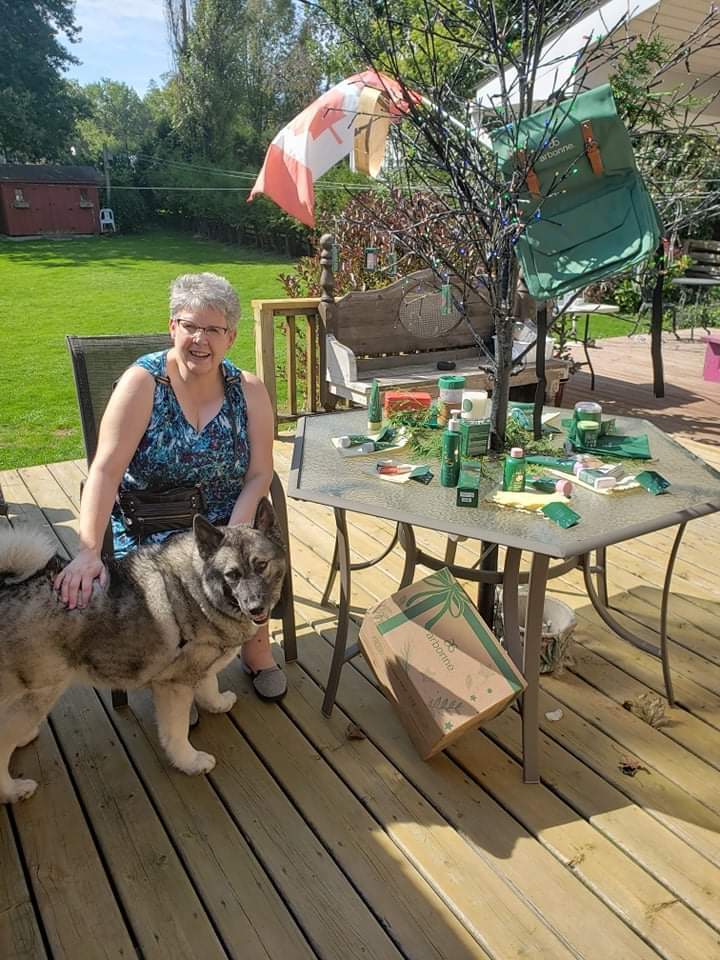- August 10, 2022
- "STAYING CONNECTED" NEWSLETTER STORY
Lisa Harper: The power of self-advocacy
by Mary Dufton

Lisa Harper, who was born with spina bifida, is a woman accustomed to stepping outside her comfort zone and testing boundaries.
She grew up in Teeswater, a small rural town in Bruce County. She credits her mother, who was a nurse, with teaching her how to self-advocate with her many physicians and the medical community in general. As soon as Lisa turned 18, she went to her medical appointments by herself, as she could drive.
“When I was born, my parents asked the doctors how they should parent me ‘differently from my brothers’. The doctors told them not to, and to treat me just like my brothers. In fact, they suggested that my parents should be harder on me as I might use my disability as an excuse not to thrive, so that’s what they did.
“As a result, I have always been active both mentally and physically, and very community minded. I was a member of the local Junior Farmers and 4-H clubs; a Brownie and Guide Leader and as I grew older, became involved in my local Lions/Lioness Club. In 1987, I was one of 11 youth from across Ontario who received an Ontario Junior Citizens of the Year Award.
“I have made lifelong friends from these interactions, and I would not be who I am today without having stepped outside my comfort zones and testing my boundaries.”
Lisa has a BA in Communications from Brock University and has worked full-time for her local United Way – Perth, Huron as a Resource Development Manager and a Community Information Associate since January 2021. She feels fortunate to be working in the community and to have the flexibility to work from home if needed.
Growing up, Lisa had many surgeries which kept her away from her family, friends and school. Lisa attended mainstream school and was a good student. She participated in Phys Ed but there weren’t many activities she could do. At that time, teachers did not know much about students with disabilities and how to respond, since it was not talked about.
Because of her lack of bladder control and need for self-catheterizations, she used the teacher’s staff washroom. Although she had many school friends, like many of us with disabilities, she did experience bullying from her peers. “Grades six to eight were the hardest. The kids were rude and nasty. The younger grades were more curious and asked a lot of questions.
“There was an older boy who was bullying me, and I wanted him to stop. I followed him into the washroom, kicked in the door and hit him with one of my crutches. I was sent to the principal’s office and disciplined. My mother was not impressed with me, but instead of being angry, she used this episode as an opportunity to teach me a lesson about being compassionate of others. She believed the boy was likely acting out and had his own problems. A few years later, Lisa and the very same boy became friends and had school lockers side by side.
Lisa joined Hydrocephalus Canada (formerly Spina Bifida and Hydrocephalus Association of Ontario) 20 years, seeking a support group for adults with spina bifida and or hydrocephalus. She established a Tasters Club in Blyth, Ontario, where she and Keith live.
“Since that time, I have stayed connected with the association, and reached out for health information, attended workshops and I am currently part of the monthly online group that meets to connect and share, with the guidance of Shauna Beaudoin and Andrea Walters.”
Lisa has been happily married to Keith, since 2000. They chose not to have children; instead, they are very close to their many nieces and nephews who visit often. Lisa and Keith are dog lovers and have a Norwegian Elk Hound named Strider.
With aging, Lisa has faced many challenges related to her disability, but remains dedicated and focused in keeping things on track. She has had two hip replacements and her goal is to not need the walker or canes to walk by the end of the summer. She has monthly massage and physiotherapy treatments and sees a chiropodist to treat her foot callouses.
Lisa’s biggest issue with having spina bifida is managing her bladder incontinence. “I am always looking for washrooms when I go places. It was hard during the pandemic because the washrooms were all closed and last summer, I had to self-catheterize at the side of the road. I took washrooms for granted.
Lisa offers lots of helpful advice for anyone living with a disability: “You are not alone in your struggles. Reach out to disability organizations, such as Hydrocephalus Canada, become involved in your community, put yourself out there. Share your stories and expertise.
“Self-care is essential. I am talking about more than a cup of tea and a bubble bath! Exercise, meditation, reading, physiotherapy and counselling are critical to your overall outlook. For doctors’ visits, bring a notebook with a list of questions and take notes.”




